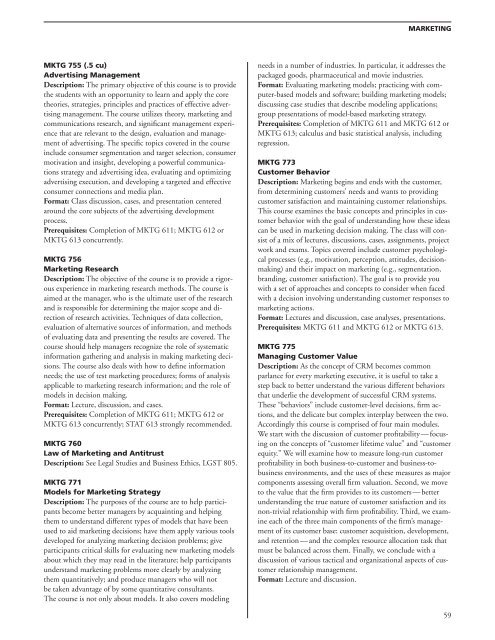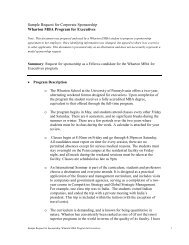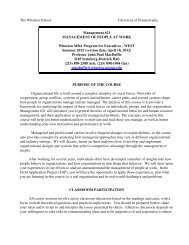Explore Options; Plan Your MBA Academic Program
Explore Options; Plan Your MBA Academic Program
Explore Options; Plan Your MBA Academic Program
Create successful ePaper yourself
Turn your PDF publications into a flip-book with our unique Google optimized e-Paper software.
MKTG 755 (.5 cu)<br />
Advertising Management<br />
Description: The primary objective of this course is to provide<br />
the students with an opportunity to learn and apply the core<br />
theories, strategies, principles and practices of effective advertising<br />
management. The course utilizes theory, marketing and<br />
communications research, and significant management experience<br />
that are relevant to the design, evaluation and management<br />
of advertising. The specific topics covered in the course<br />
include consumer segmentation and target selection, consumer<br />
motivation and insight, developing a powerful communications<br />
strategy and advertising idea, evaluating and optimizing<br />
advertising execution, and developing a targeted and effective<br />
consumer connections and media plan.<br />
Format: Class discussion, cases, and presentation centered<br />
around the core subjects of the advertising development<br />
process.<br />
Prerequisites: Completion of MKTG 611; MKTG 612 or<br />
MKTG 613 concurrently.<br />
MKTG 756<br />
Marketing Research<br />
Description: The objective of the course is to provide a rigorous<br />
experience in marketing research methods. The course is<br />
aimed at the manager, who is the ultimate user of the research<br />
and is responsible for determining the major scope and direction<br />
of research activities. Techniques of data collection,<br />
evaluation of alternative sources of information, and methods<br />
of evaluating data and presenting the results are covered. The<br />
course should help managers recognize the role of systematic<br />
information gathering and analysis in making marketing decisions.<br />
The course also deals with how to define information<br />
needs; the use of test marketing procedures; forms of analysis<br />
applicable to marketing research information; and the role of<br />
models in decision making.<br />
Format: Lecture, discussion, and cases.<br />
Prerequisites: Completion of MKTG 611; MKTG 612 or<br />
MKTG 613 concurrently; STAT 613 strongly recommended.<br />
MKTG 760<br />
Law of Marketing and Antitrust<br />
Description: See Legal Studies and Business Ethics, LGST 805.<br />
MKTG 771<br />
Models for Marketing Strategy<br />
Description: The purposes of the course are to help participants<br />
become better managers by acquainting and helping<br />
them to understand different types of models that have been<br />
used to aid marketing decisions; have them apply various tools<br />
developed for analyzing marketing decision problems; give<br />
participants critical skills for evaluating new marketing models<br />
about which they may read in the literature; help participants<br />
understand marketing problems more clearly by analyzing<br />
them quantitatively; and produce managers who will not<br />
be taken advantage of by some quantitative consultants.<br />
The course is not only about models. It also covers modeling<br />
MARKETING<br />
needs in a number of industries. In particular, it addresses the<br />
packaged goods, pharmaceutical and movie industries.<br />
Format: Evaluating marketing models; practicing with computer-based<br />
models and software; building marketing models;<br />
discussing case studies that describe modeling applications;<br />
group presentations of model-based marketing strategy.<br />
Prerequisites: Completion of MKTG 611 and MKTG 612 or<br />
MKTG 613; calculus and basic statistical analysis, including<br />
regression.<br />
MKTG 773<br />
Customer Behavior<br />
Description: Marketing begins and ends with the customer,<br />
from determining customers’ needs and wants to providing<br />
customer satisfaction and maintaining customer relationships.<br />
This course examines the basic concepts and principles in customer<br />
behavior with the goal of understanding how these ideas<br />
can be used in marketing decision making. The class will consist<br />
of a mix of lectures, discussions, cases, assignments, project<br />
work and exams. Topics covered include customer psychological<br />
processes (e.g., motivation, perception, attitudes, decisionmaking)<br />
and their impact on marketing (e.g., segmentation,<br />
branding, customer satisfaction). The goal is to provide you<br />
with a set of approaches and concepts to consider when faced<br />
with a decision involving understanding customer responses to<br />
marketing actions.<br />
Format: Lectures and discussion, case analyses, presentations.<br />
Prerequisites: MKTG 611 and MKTG 612 or MKTG 613.<br />
MKTG 775<br />
Managing Customer Value<br />
Description: As the concept of CRM becomes common<br />
parlance for every marketing executive, it is useful to take a<br />
step back to better understand the various different behaviors<br />
that underlie the development of successful CRM systems.<br />
These “behaviors” include customer-level decisions, firm actions,<br />
and the delicate but complex interplay between the two.<br />
Accordingly this course is comprised of four main modules.<br />
We start with the discussion of customer profitability — focusing<br />
on the concepts of “customer lifetime value” and “customer<br />
equity.” We will examine how to measure long-run customer<br />
profitability in both business-to-customer and business-tobusiness<br />
environments, and the uses of these measures as major<br />
components assessing overall firm valuation. Second, we move<br />
to the value that the firm provides to its customers — better<br />
understanding the true nature of customer satisfaction and its<br />
non-trivial relationship with firm profitability. Third, we examine<br />
each of the three main components of the firm’s management<br />
of its customer base: customer acquisition, development,<br />
and retention — and the complex resource allocation task that<br />
must be balanced across them. Finally, we conclude with a<br />
discussion of various tactical and organizational aspects of customer<br />
relationship management.<br />
Format: Lecture and discussion.<br />
59

















